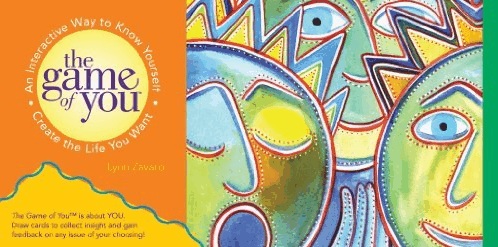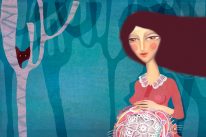Update: The winners for this giveaway have already been chosen. Subscribe to Tiny Buddha for free daily or weekly updates and to learn about future giveaways!
The winners:
Lynn Zavaro has very quickly become one of my greatest role models.
When she first submitted a post to Tiny Buddha (50 Creative Questions to Help You Create the Life You Want) I felt like she was living inside my head.
Lynn realizes that the most important factor for our happiness is coming to know ourselves—and she also understands the internal blocks that hold us back from living the lives we dream about. Why? Because she’s human and imperfect, just like everyone else, and she’s lived a bold life of self-discovery, authenticity, and adventure.
An artist, writer, and teacher, Lynn holds a Masters degree in Counseling Psychology. This combination of experience gives her a unique insight into human nature—and she leveraged it to create a fun, creative book and card deck set called The Game of You.
I received my set a few weeks back, and I’ve become addicted. The Game of You provides a simple, enjoyable way to understand and stretch yourself, little by little, every day.
I’m excited that Lynn took some time to share a little about herself and her work, and also that she’s generously offered to give away 5 sets of The Game of You.
The Giveaway
To win 1 of 5 free sets of The Game of You:
- Leave a comment on this post.
- Tweet: RT @tinybuddha Giveaway and Interview: The Game of You by Lynn Zavaro http://bit.ly/tEit98
You can enter until midnight PST on Friday, November 4th. If you don’t have a Twitter account, you can still enter by completing the first step.
The Interview
1. Many Tiny Buddha readers may know you as an insightful, giving writer and artist, as you’ve contributed a wide range of inspiring, thought-provoking posts to the site! Can you tell us a little more about yourself?
First off I have to say what an honor it is to contribute to Tiny Buddha. I have personally received so much from it–so a big thank you to you Lori and to the Tiny Buddha community!
I guess you could say that I am person who loves to meet every creative moment wholeheartedly. I am passionate about supporting others in feeling the best about themselves and creating the kind of lives they truly want. Although, I do have a psychological background, I am interested in our hearts, how they beat, how we love others and ourselves at our utmost capacity and the ways in which we can better ourselves in order to better the world.
2. With both a card set and corresponding book, The Game of You is certainly unique! What motivated you to create it this way?
I was looking for a long time to bring together all my passions: Writing, painting, design, spiritual, psychological and creative teachings, etc. Sitting at my kitchen table one night, the vision came to me of The Game of You and instantly I felt a tremendous amount of energy run through my body that has continued to remain with me since.
The idea of it being a game, a fun way to discover yourself in the present moment, thrilled me because that’s what life is–a big game that we play and learn how to move the pieces around. Inner work shouldn’t have to be drudgery, and after many years of inward exploration, I found it was easier and actually reaped more benefit when holding it with a lighter hand.
3. You’ve written that the object of The Game of You is to know who you really are, what you want, and how to get there. Why do you think we struggle to know who we really are?
I believe we come into this world with a certain map that’s encoded in our DNA. We are born with a certain truth of who we are, but it gets covered up by conditioning, our parents, teachers, and society’s beliefs. So a lot of growing up and discovering who we are is a de-layering process, getting to the root of our inherent nature by stepping through fear and connecting back to the pulse of our beating heart.
It’s not easy to drop the thoughts that we carry about ourselves because they become so ingrained and patterned. But when we choose to walk our life path with awareness and a willingness to learn and grow, we touch our depths and reap tremendous rewards.
4. And why do we struggle to identify what we want?
There can be tremendous resistance to making choices in our lives. We fear one path may take us down a wrong road. But there are no wrong roads–each path takes us to a certain destination to make better decisions. The trick is making a choice, testing it out, and then making another one and then another one.
Rumi says, “Out beyond right-doing and wrong-doing there is a field. I’ll meet you there.” We fear making choices because we fear the spaciousness of the field. It asks us to makes choices without a guaranteed outcome, and innately as humans we grasp to what is familiar and safe because we fear the unknown. The Game of You supports one to make simple choices by drawing one card at a time, taking small action steps, like dribbling a ball towards our inner and outer goals.
5. The sections in the card set and book include day-to-day, relationships, and life path. Why did you choose these three topics as the foundation of the game?
It seems to me that these are three main issues we grapple with in each of our present moments–they are on our mind all of the time whether we are aware of them or not: How do I get through my day-to-day at my very best, how do I deal with my relationships, and how do I transition through major life changes and discover my larger life purpose?
6. In the day-to-day section, you’ve broken it down into four parts: mental, emotional, spiritual, and physical. Do you find that some people need to focus more on one than the others?
When we are in touch with our whole being at any given time we address all four levels of consciousness. The Game of You supports you to realize when one or another is out of sync in order to come into complete balance.
For example, I may feel like I can understand and conceptualize an issue (mental) but could be suppressing the soft gentle tears that may rest underneath it (emotional) or I may feel very connected to my spiritual practice but overlook the foundation of self-care physically such as paying close attention to my finances, how I am eating, or how much exercise I am getting, etc.
7. In each section, you provide action-oriented steps, or tools, to help readers utilize the insight from the cards. Is it best to work with just one card at a time, in order to make lasting changes?
When first using The Game of You I recommend you start simple and pull a single card, read it’s insight, and use it’s tool. Once you become more familiar with handling the deck, there are spreads at the beginning of the book to pull more than one card in order to take your inner-work to a deeper level.
8. You’ve said that you work with own tools consistently. Do you find that you keep learning more about yourself as you grow and come back to the tools?
Most definitely! I have used these tools personally for over seventeen years and supported my clients and workshop attendees with the tools for the last seven. Although these tools are only a fragment of the tools offered to us, they have been proven to be steadfast, life changing, supportive, healing, self-empowering, and tried and true.
9. What is the main thing you hope people learn from The Game of You?
It was my intention to support others to have an easy, manageable, direct experience of the application of the varied psychological, spiritual, and creative teachings and tools in their daily life. It’s so easy to take five minutes from your day and pull a card. My hope is that it is there for any person at any time of their day or in any given life moment to support the reader to address their issues, be their own teacher, and create the life they always wanted.
FTC Disclosure: I receive complimentary books for reviews and interviews on tinybuddha.com, but I am not compensated for writing or obligated to write anything specific. I am an Amazon affiliate, meaning I earn a percentage of all books purchased through the links I provide on this site.
About Lori Deschene
Lori Deschene is the founder of Tiny Buddha. She started the site after struggling with depression, bulimia, c-PTSD, and toxic shame so she could recycle her former pain into something useful and inspire others to do the same. You can find her books, including Tiny Buddha’s Gratitude Journal and Tiny Buddha’s Worry Journal, here and learn more about her eCourse, Recreate Your Life Story, if you’re ready to transform your life and become the person you want to be.
- Web |
- More Posts













 Though I run this site, it is not mine. It's ours. It's not about me. It's about us. Your stories and your wisdom are just as meaningful as mine.
Though I run this site, it is not mine. It's ours. It's not about me. It's about us. Your stories and your wisdom are just as meaningful as mine.
What a fantastic idea! The opportunity to be my own teacher is exactly what I am looking for… Thank you x
What an intriquing concept. It would be interesting to see this.
I love this. As a teacher and hypnotherapist, I appreciate the way multiple senses will be involved: touching the card; seeing the words and images; hearing the words aloud – powerful!
I’m always looking for simple yet profound tools to use with clients.
Thank you!
Sounds like an interesting and fun idea!
I really like the idea of the Game of You and would love to see it and use it!
I love that you describe Lynn as a Seeker. I think we all are Seekers. Each of us seeking our own way on the path of life.
Lori, I too am a HUGE fan of Lynn Zavaro and the Game of You. I have worked one on one with Lynn, attended her workshops and use the deck regularly. The profound insights I’ve gathered consistently amaze me. I have received some of my greatest teachings from the Game, and from my work with dear Lynn.
This is the first time I’ve heard of Zavaro, but I’m sure it won’t be the last! Her background and spiritual orientation are a perfect match for this insightful game.
This seems like such a great idea!
What a great idea! If its fun Im more inclined to do it.If it works Im more inclined to do it.
I can only imagine how powerful the combination would be and the benefit.Thank you for bringing Lyn and the Game to our attention
Hi – thanks for posting this fascinating game and the accompanying interview. I particularly like that this is one of those games which can entertain, but also does much more in terms of helping us learn about ourselves.
Can you tell I’m one of those people who don’t like to “just” have fun:)?
Looking forward to playing this game someday.
John
This is just what I’ve needed and wanted. Thank you.
what a nice idea for a game! I know of a lot of my friends who would need this!
Sounds like a very interesting and useful tool! Thanks for the post!
What a great idea! Nice way to start your day & motivate your life…..thanks for sharing!
Tiny seeker still seeking…looking forward to what I learn from ‘The Game of You’. Big thanks Lori and Lynn for your contributions to my growth.
I’d love to get my hands on one of these games. Sounds like just the eye opener I need!
I want to check out the Game of You. Namaste Vanita
I need to know how to conquer my fears and really live, not just exist. Thank you for the opportunity.
Lori, I’m so grateful to have discovered Tiny Buddha, it has helped me to help others and myself by sharing the wisdom! Lyn’s book and game sounds like another great tool for expanding my life and turning possibilities into reality!
Here’s my entry! Sounds like an interesting game. Joanne D
This is such a fun idea. I hope I get the chance to try it.
So excited about this new game that’s all about ME! Hope to win (pick me! pick me!). Thanks for your generous offer…
Looks fun and valuable – a great combination!
I love this line from your interview: “…could be suppressing the soft gentle tears that may rest underneath….” This describes me as if you knew me and all you wanted to do was to hold me while I cried. Thank you and thanx to all who have contributed to Tiny Buddha. You help and inspire me beyond measure.
We hold each other up here on this site:) xoxoxo Lynn
Thank you and many blessings to you and yours ~ Mloza
Looks like a very fun and creative package. *dons my wild explorers hat
Thank you for sharing your gifts
Would absolutely love to add some tools to my daily life to play the game of ME!
What a great game! Would love to try it.
Intrigued…
I really am intrigued by this tool; I think it would be a great way to work on self understanding and could be utilized in my coaching sessions.
I am intrigued by the idea of this game! Thank you for writing about it. Is it something that could be used with a curious teen? As a family? Thanks! I would love to try it.
Awesome – thanks! <3
Sounds like a fun tool! I think my hubs could benefit from it! 🙂
Looks like fun! Congrats!
And apparently I like it so much I double posted. 🙂
Would love to try this out. 🙂
Wonderful! Another avenue of self-discovery
Think i need this ……. looks so good
Sounds awesome ! It sounds enlightening as well as very soul searching!
If the universe chooses me to get one of these games, so be it. I would be pleased if I did. Namaste!
Very excited about this giveaway. A wonderful experience ahead…
This looks wonderful. I teach counseling at a community college and insist that my students engage in self examination. I tell them they cannot take their clients any further than they are willing to go themselves. This would be a great addition to things I use.
I sooooo wanna play this game!!!!! (Eny)
This is such an important event. Thank you for sharing it.
Sounds like fun – enlightenment is the ulimate goal.x
This sounds wonderful. Id love to get one.
You offer so many great giveaways, but I’m really, really hoping to get lucky this time. This looks so creative and wonderful! Thank you for sharing!
Have tried out the game of life teaser and would love to be able to play on a daily basis.
Awesome…I would love to win this!